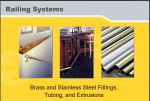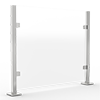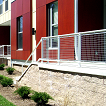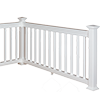To visit our CT sample showroom, please call 1-877-810-4116 to schedule an appointment. Store pickups are available at our CT warehouse shipping dock.
States Building Codes
| State Codes | |
| State | Building Code |
| Alabama | 2006 IBC with state amendments. |
| Alaska | 2003 IBC with state amendments is mandatory for all buildings except one- two- and three-family dwellings. |
| Arizona | Arizona Revised Statute 41-1511 is based on 2000 IECC and ASHRAE 90.1-99. Mandatory for all state-owned and state-funded buildings. |
| Arkansas | Based on the 2000 IBC and 2000 IRC with state amendments. Local jurisdictions may amend the code to make it more stringent. |
| California | 2007 California Building Code (Title 24, Part 2), based on the 2006 IBC with state amendments, is applicable to all buildings. Local jurisdictions may amend the code to make it more stringent only if topographical, geological, or climatic conditions warrant. |
| Colorado | 2006 IBC is mandatory for hotels, motels, and a multi-family dwelling in any jurisdiction that does not adopt or enforce local codes. Local jurisdictions adopt codes. |
| Connecticut | Based on 2003 IBC and 2003 IRC with state amendments and is mandatory for all buildings. Local jurisdictions may not amend. |
| Delaware | 2003 IBC with state amendments. |
| Florida | Based on the 2006 IBC and 2006 IRC with state amendments is mandatory for all buildings. Local jurisdictions may amend the code to make it more stringent. |
| Georgia | Based on 2006 IBC and 2006 IRC with state amendments, is mandatory for all buildings. Local jurisdictions, with state review, may amend the code to make it more stringent with state review. |
| Hawaii | Administrative Rules, Title 11, Chapter 14, Housing, is state written. Local jurisdictions may amend the code to make it more stringent. |
| Idaho | 2006 IBC mandatory for all state owned buildings and public schools, voluntary for all other occupancies. Local jurisdictions may amend the code to make it more stringent. The 2006 IRC is mandatory for all one- and two-family dwellings. |
| Illinois | 2006 IBC with state amendments. |
| Indiana | 2006 IBC with state amendments. Mandatory for all buildings except 1 and 2-family dwellings and agricultural buildings. Local jurisdictions may amend to make more stringent only with state approval. Indiana Residential Code is based on 2006 IRC with state amendments and is mandatory for all one- and two-family dwellings and townhouses. Local jurisdictions may amend the code to make it more stringent with state approval. |
| Iowa | Based on the 2006 UBC with state amendments and is mandatory for state-owned buildings and within jurisdictions that adopt the state code. Local adoption is voluntary. Iowa State Building Code is based on the 2006 IRC with state amendments and is mandatory where local jurisdictions adopt the state code. |
| Kansas | 2006 IBC applies to all state-owned buildings and public schools and is voluntary for other occupancies. |
| Kentucky | Based on the 2006 IBC with state amendments as is mandatory for all buildings except farm dwellings. Local jurisdictions may not amend the code. Kentucky Residential Code is based on the 2006 IRC with state amendments and is mandatory for all one- and two-family dwellings. |
| Louisiana | Based on 2003 IBC and applies to all buildings except one- and two-family dwellings. Local jurisdictions may amend to make it more stringent. The 2006 IRC is mandatory for all one- and two-family dwellings. Local jurisdictions may not amend the code. |
| Maine | Based on the 2006 IBC is applicable for all buildings and is mandatory for any locality adopting a building code. Local jurisdictions may amend the code. Maine Model Building Code is based on 2006 IRC and is applicable to residential construction in localities adopting a building code. Local jurisdictions may amend. |
| Maryland | Based on 2006 IBC and 2006 IRC with state amendments and applicable to all buildings. Local jurisdictions may amend the code. |
| Massachusetts | Massachusetts Building Code for 1 & 2 Family Dwellings, based on 2003 IRC with state amendments. Local jurisdictions may amend the code to make it more stringent with state approval. 2003 IBC may apply |
| Michigan | Building Code Rules, Part 1-4 is based on the 2003 IBC with state amendments. Local jurisdictions may not amend the code. Building Code Rules, Part 4, is based on the 2003 IRC with state amendments. If adopted locally, local jurisdictions may not amend the code. |
| Minnesota | Based on 2006 IBC, 2006 IRC and 2005 NEC with state amendments. The code applies where local jurisdictions have adopted the code and local jurisdictions may not amend the code. |
| Mississippi | Based on the 2003 IBC and 2003 IRC with state amendments. Local jurisdictions may amend the code. |
| Missouri | Capital Improvement and Maintenance Program is based on the 2000 IBC and is mandatory for all state facilities. |
| Montana | Based on 2006 IBC with state amendments and applicable to all buildings except residential with 5 or less living units and agricultural buildings. Local jurisdictions may not amend. Residential Code is based on 2006 IRC with state amendments and applicable to one- and two-family dwellings. Local jurisdictions may not amend the code. |
| Nebraska | Based on 2000 IBC and is mandatory for state owned buildings. |
| Nevada | Nevada Public Works Board based on 2003 IBC is applicable to all state-owned facilities and public schools. |
| New Hampshire | Based on the 2006 IBC is mandatory for all buildings except one- and two-family dwellings. Local jurisdictions may amend the code to make it more stringent. Residential Code is based on 2006 IRC |
| New Jersey | Based on 2006 IBC with state amendments. Local jurisdictions may not amend the code. State Uniform Construction Code, One- and Two-Family Dwelling Subcode is based on the 2006 IRC. Local jurisdictions may not amend the code. |
| New Mexico | Based on 2006 IBC and 2006 IBC with state amendments. Local jurisdictions may amend the code to make it more stringent |
| New York | Based on the 2003 IBC and 2003 IRC with state amendments. Local jurisdictions may amend the code to make it more stringent with state approval. |
| North Carolina | Based on the 2003 IBC with state amendments. Residential Code, Chapter 11 is based on 2000 IRC with state amendments. |
| North Dakota | Based on the 2006 IBC and 2006 IRC is only mandatory if adopted by local jurisdictions. Local jurisdictions may amend the code to conform to local needs. |
| Ohio | Based on the 2006 IBC with state amendments. Mandatory for all except 1, 2, and 3-family detached. Local jurisdictions may supplement. The Residential Code of Ohio is based on the 2006 IRC and is mandatory in any jurisdiction with a residential code. |
| Oklahoma | Based on the 2006 IBC and is the mandatory minimum for all facilities constructed for state use. |
| Oregon | Based on 2006 IBC with state amendments. Local jurisdictions may amend the code with state approval. Oregon One- and Two-Family Dwelling Specialty Code is based on 2006 IRC with state amendments. Local jurisdictions may amend the code with state approval. |
| Pennsylvania | Based on the 2006 IBC and 2006 IRC and is mandatory for all buildings. Local jurisdictions may not amend. |
| Rhode Island | Based on 2006 IBC with state amendments is mandatory for all buildings and local jurisdictions may not amend. One- and Two-Family Code Regulation SBC-2-2004, based on the 2006 IRC with state amendments, is mandatory for one- and two-family dwellings. Local jurisdictions may not amend. |
| South Carolina | 2006 IBC and 2006 IRC with state amendments. Local jurisdictions may amend with Building Code Council approval. |
| South Dakota | 2003 IBC with state amendments. |
| Tennessee | 2006 IBC is applicable to all buildings except one- and two-family dwellings, licensed health-care facilities and non-residential agricultural structures. Local jurisdictions may amend the code to make it more stringent. |
| Texas | Based on 2003 IBC, mandatory for commercial building. Local jurisdiction may amend or adopt more current edition. Residential Building Code is based on 2000 IRC and is mandatory in jurisdictions adopting a building code. |
| Utah | Based on 2006 IBC and 2006 IRC with state amendments. Local jurisdictions may amend the code with state approval. |
| Vermont | Based on the 2006 IBC with state amendments is mandatory for all public buildings, condominiums, multi-family dwellings, and occupancies involving hazardous materials. The code is voluntary for all other occupancies. Local jurisdictions may amend the code to make it more stringent. |
| Virginia | Based on 2006 IBC and 2006 IRC with state amendments. Local jurisdictions may not amend the code. |
| Washington | Based on 2006 IBC and 2006 IRC with state amendments. Local jurisdictions may amend the code to make it more stringent. |
| West Virginia | Based on 2006 IBC and is mandatory statewide. Exception: stair treads and risers revert back to 1993 NBC. The Residential Code is based on 2006 IRC. Applicable to 1-and 2-family dwellings except stairway design and construction reverts back to 1992 OTFDC |
| Wisconsin | Building, Heating, Ventilating, and Air-Conditioning Code applies to public buildings, places of employment and high-rise multi-family buildings based on 2006 IBC with state amendments. Uniform Multi-Family Dwelling Code applies to multi-family dwellings with 3 or more dwelling units and 6 stories or less in height are based on 2006 IBC. Local jurisdictions may amend the Building, Heating, Ventilating, and Air-Conditioning Code to make it more stringent. Local jurisdictions may not amend the Uniform Multi-Family Dwelling Code. |
| Wyoming | Based on 2006 IBC. Local jurisdictions may amend the code to make it more stringent. |
Sources: The information above was gathered for your convenience. Please note that we are not responsible for any mistakes or missing information. It is imperative that you familiarize yourself with local code requirements. | |




















































































